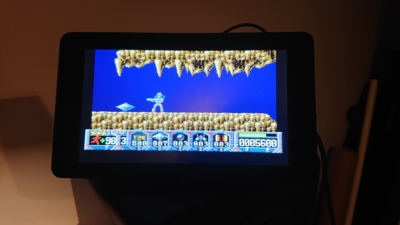Recently our good friend the J-Man posted something on twitter that echoed a very familiar sentiment for me:
I’m sure a fourth device is just what I need to get me into playing retro console games regularly 👍🏼
— Johnny Bomb Squad (@BurningStickMan) December 31, 2021
We retro gamers often find we’re not spending as much time as we’d like on our hobby. Myself, I have a toddler to care for which I suppose is a bit more important (hello dear wife, I mean MUCH more important of course and I will definitely read more books to her today). Even those without children, though, find themselves accumulating responsibilities and commitments as they get older. Saturdays are spent mowing the lawn and shopping for curtains; devoting most of the day gaming is a luxury for the under-30s.
I won’t pretend I have zero free time but when some does come along might be tempted away by (whisper the heresy) new games. Well not very new because I’m cheap and my main PC is a decade old, but still too recent to be considered retro (or relevant to this site). Also by about 10pm, I’m frequently just too worn out for gaming. Especially something complex like strategy or RPGs. Slumping in front of netflix seems like the easier option.
Furthermore there’s a sort of paralysis that can set in when confronted with too many choices. I have both a huge gog backlog, and massive lists of console ROMs. I pour through lists of games, wonder if I’ll be able to commit, think of reasons why each choice might be a bad use of time…. then end up not playing anything at all.
So what can bust people like me out of this rut? It’s easy to think what’s needed, to finally focus my mind and devote time to the classics, is another device to play them on. Something that’s more convenient to use, or enhances the experience somehow. Something specfically tailored for retro-gaming. After all, there are so many options now.
We could start with the various mini consoles, each devoted to emulation of a particular system such as the SNES or Amiga 500. They come pre-loaded with games so pretty much all you have to do is plug into your TV and switch them on. Downside is, it’s difficult to add more games unless you start hacking them.
Then there are more advanced options if you want a general-purpose device capable of emulating multiple systems, and are willing to do a bit of tinkering. The Rasberry Pi, the tiny and versatile little linux PC, is a popular choice. There’s also something I recently encountered called miSTer which uses FPGAs, eg it’s hardware emulation instead of software, so should be faster and more accurate.
In his tweet the J-Man was here referring to one the plethora of emulation handhelds that have sprung up in the past decade or so. They tend to have fairly humble specs but are handy for 8 and 16 bit systems, maybe N64 an PS1 in some cases. Just like any other portable device, I could take one with me a train journey or play on them without even getting out of bed (lazy git).
Yet through years of experience, I’ve learned the hard way that new toys don’t help all that much. I had one of those handhelds, a JXD 8700. It gathered dust in a drawer for years. This was way before covid hit but even back then I had virtually no commute so didn’t actually spend any time on trains. Also if I try playing anything in bed i just fall asleep. Plus it was kind of big and clunky. So it went back from whence it came. (ebay).
Meanwhile I spent a week setting up RetroPie on my pi. Most of the installation is straightforward but I still had to tinker with settings, copy roms over and then deal with a reluctant usb speaker. Linux seems so modern and plug-and-play these days until something goes wrong, then you’re deep into the forbidden realms of esoteric technical secrets. After hours of pouring over forum posts and not understanding the mystic incantations to evoke sound drivers, I gave up and dug out some headphones. After all that I spent less than an hour playing anything. It’s sat on my desk right now, filling me with shame.
My mini NES and SNES have seen some genuine use at least, but a lot of that is fairly casual. Just goofing around for a few levels before dinner, or playing my wife at Mario Kart (yes dear, I mean losing to you at Mario Kart). I don’t see myself ever tackling something that requires lengthy time commitments such as Chrono Trigger; I rarely fire the minis up for more than 30 minutes at a time.
Ultimately all the hardware I need for retro gaming is the hardware I’ve always used: PCs running emulators. A big whirring old tower in the study and a Surface Go I can use from the comfort of the living room. If I’m not retro-gaming on those, I won’t do so on any other gadget. All the other duties, and time constraints apply. The fatigue and malaise is still there. The novelty of another device is only a temporary relief from these problems; it doesn’t fundamentally alter anything about my approach to gaming.
So then this is not a hardware problem, but one of time management and motivation. If I want to play old games more, I need to set aside blocks of time and carry out household chores more efficiently to maximise that time. I’ve also got to push myself little harder and say ultimately, this will be more rewarding than watching TV. Finally though, I need to make peace with the fact that I’ll never have as much time as I did in my youth, and make gaming decisions with some appropriate wisdom. For example, no more than one RPG on the go at a time.
So anyway with a new mindset I may end up gaming more, and writing here more. Or I may not. Either way I’ve told myself I don’t need another try at emulation handhelds, even if they look perfect for retro-platformers and old apogee games. Also I’m giving the build-your-own approach a rest for a while, miSTer doesn’t offer anything I need and I’m not going to go buy a fourth generation pi until I get more use out my pi3. I’m resolved to resist any further temptation: there will be no more devices.




 Posts
Posts
I wish I had your resolve.
Meantime, we’ll see if my new Retroid Pocket 2+ results in me actually writing things again!
January 12, 2022 @ 7:58 pm
Well if does, we all benefit!
January 12, 2022 @ 9:42 pm